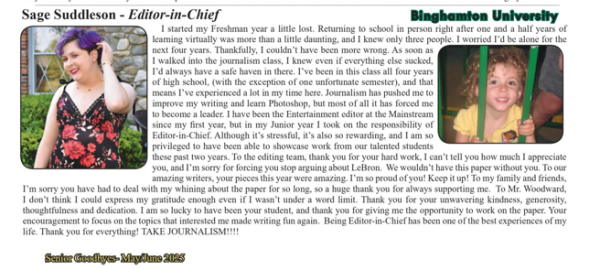Inside the Minds of AP Psychology
Throughout high school, students struggle with classes that are all too often not interesting or truly engaging. However, for AP Psychology (AP Psych) students, this is certainly not the case.
AP Psych is an advanced placement class offered by the College Board that offers high school students the opportunity to earn college credits for an introductory-level psychology course. Not only does this class allow high school students to potentially earn college credits [if the AP exam is passed with a 3 or higher], it also broadens students’ perspective on the world around them.
Before you jump right in and sign up, remember, it is an AP class, which means it takes hard work and dedication; AP Psych is an enjoyable class, but it is no walk in the park. Students are expected to read multiple pages a night along with taking Cornell notes and being well prepared to take several quizzes, quests and tests per semester. However, once you’ve got your work ethic down, the fun begins.
In the class students conduct a number of experiments that help them develop a better understanding of all of the theories taught in class. A favorite in-class experiment is one on the theory of positive reinforcement. In this experiment, the class studies, develops theories, and then proves that people tend to do better at things when they are rewarded – in this case by giving them M&Ms for doing good actions. Senior Gloria Penka says she “enjoyed the experiment because it taught me how to get people to do what I want.”
AP Psych explores the depths of the human mind and answers many of the questions that people have been wondering about all of their lives. Students, including senior Silvia D’costa, commonly find themselves taking what they’ve learned in class and applying it to everyday life.
D’costa admits to “taking my friends to Chick-fil-A so that they’ll be nice to me. In AP Psych I learned this is classical conditioning and positive reinforcement.”
AP Psych also helps students learn to consider other people’s reasoning before taking action. It teaches them to base people’s action on what they’ve been through (environment) rather than blaming it solely on their attitude. For example, if one’s mom comes home from work with an extremely cranky attitude, one should take into consideration that maybe she was having a bad day before judging her too harshly or developing an attitude.
AP Psychology teacher Mr.Montalvon, who is in his second year at Paint Branch and ninth year teaching, says that he enjoys teaching psychology. “I remember taking and enjoying AP Psychology many years ago,” says Mr.Montalvan. “The class inspired me to major in psychology as an undergraduate student and I feel incredibly fortunate to teach psychology.”
Mr.Montalvan advises incoming AP Psych students to “be prepared for the workload and to participate in class demonstrations and discussions.” He also wants to remind students to follow teachers’ instructions because they provide them for a reason. Ultimately, he wants students to understand that, in the class they can “have fun.”
He also hopes that “students take away an appreciation for their brain — your brain makes you who you are and you are capable of many things. Moreover, I hope students have a better understanding of human behavior and will think twice before making quick judgments.”










































